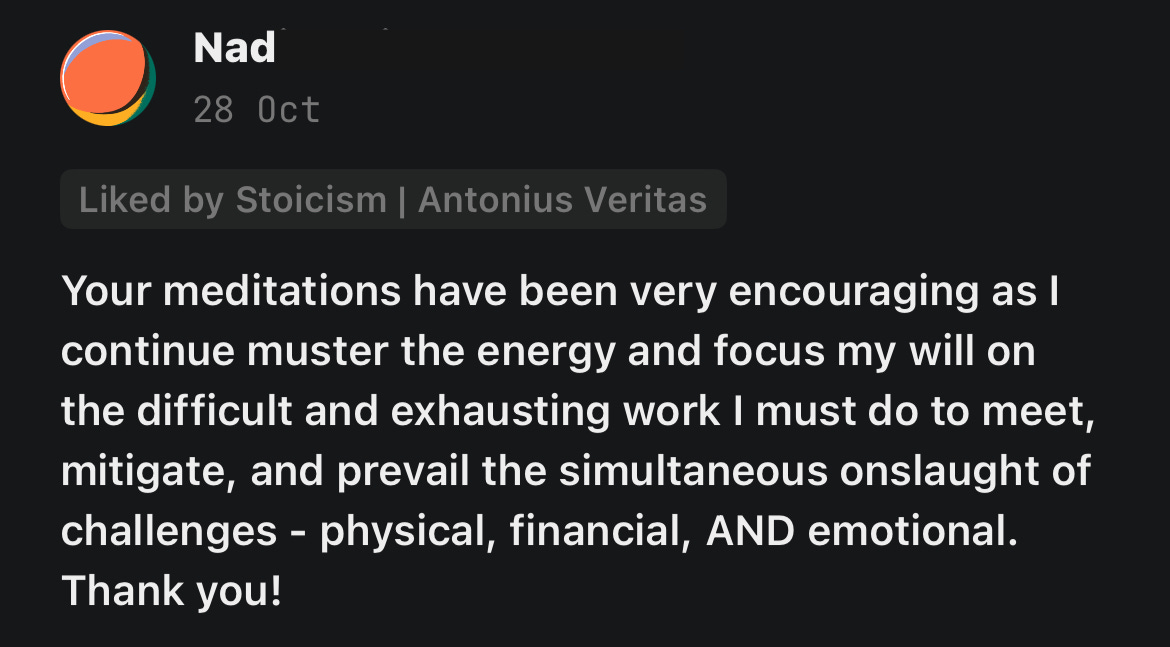Lead to Win IV. The Power of Relationships
Without strong relationships, even the most brilliant ideas falter in execution.
The ‘Lead to Win’ section is a companion for The Stoic Manual to help you become wealthier, happier & more powerful through the best strategies and tactics to succeed at leading in your workplace, family, and business—by Dr. Antonius Veritas. Complement this with the ‘Neuroscience-based Tools’ section.
P.S: Skip to the end for a mini-course, a step-by-step guide on the best way to build relationships with your boss and followers—without the indignity of flattery. Worth $4,000.
Introduction
Many of you have requested me to tackle Leadership through Stoic principles.
I’ve therefore launched the Lead to Win section in that regard.
We’ll use some scenarios and stories from the hospital setting for illustrative purposes.
But you don’t have to know what every jargon means to get value from the entries.
I want to reassure you that once you get the concept, from a first principles perspective, you’ll be able to apply it in any field.
Miyamoto Musashi said it best,
“If you know the way broadly, you will see it in everything.”
In the following weeks, we’ll build up your Foundation as a leader because you’re only as strong as it is sturdy.
Then we’ll move forward to other themes.
I recommend you read these entries in series, from the first one, while applying the practical guides of the mini-course I’ll be providing at the end.
Foundation 4. The Power of Relationships
"Toward subjects, one should strive to be regarded with awe rather than with fear. Reverance attends the one, bitterness the other." — Musonius Rufus
As doctors, our ability to lead isn’t defined solely by clinical acumen or technical prowess—it’s anchored in relationships.
These relationships, whether with our superiors, peers, or subordinates are the arteries through which trust, communication, and collaboration flow.
Not mere social niceties.
Leadership thrives on this trust.
It’s what allows us to advocate effectively, rally teams during crises, and influence decisions that ripple across departments.
For without strong relationships, even the most brilliant ideas falter in execution.
But with them, we can turn a good team into an exceptional one.
Building a Relationship with Your Boss
Strong relationships with our superiors aren’t about flattery, many people make that mistake and wonder why they’re always overlooked—they’re about establishing credibility.
Imagine a situation where a senior physician proposes a treatment protocol that doesn’t sit well with your clinical judgment.
How do we approach this?
Certainly not by confrontation or outright rejection.
Instead, we frame our concerns as earnest questions.
P.S: I’ll show you how to ask these questions effectively in the practical section.This reframes the discussion, focusing on collaboration rather than opposition because it’s about genuinely understanding another person’s perspective.
However, before raising concerns, we must assess their significance.
Is this disagreement about a genuine patient safety issue, or is it about our personal preference?
If it’s the latter, humility and adaptability go a long way.
Ego is the enemy of trust, and trust is the currency of influence.
Performance as the Foundation of Trust
Earning trust with superiors starts with reliability.
It’s not the grand gestures, gifts, or sweet words but the quiet consistency that builds relationships.
Complete tasks without excuses, limit the execution budget, step into challenging roles, and solve problems with minimal drama to send one message:
“I’m dependable.”
For instance, volunteering to handle an administrative backlog or stepping in for a colleague who’s overwhelmed might seem thankless, but these small wins accumulate.
Each time we deliver without complaint or drama, we gain credibility.
Over time, this credibility becomes clout—the kind that ensures our concerns and ideas are heard when it matters most.
Leading Across and Below
What about our subordinates?
They’re often the first to spot flaws in plans, and their respect hinges on our ability to acknowledge and navigate those flaws.
Transparency and honesty are essential here.
If a decision from above seems less than ideal, acknowledging it without undermining authority is key.
P.S: I’ll show you how to communicate this situation effectively in the practical section.This approach fosters alignment without blind compliance.
However, being overly deferential to authority can erode respect.
Speaking up becomes imperative if a decision genuinely compromises patient care or team morale.
The balance lies in knowing when to push back and when to lead through execution.
Practical Ideas to Strengthen Relationships and Lead Effectively
The actionable strategies below will help you build relationships with your boss and followers—without the indignity of flattery.
You’ll also get scenario examples of what to say to draw inspiration from in your communication so that you can lead effectively and your team can win.
Let’s dive in…
Do you like this entry so far? ⭐️
Support the publication to read the rest and access 100+ practical insights and Mini-courses to help you apply Stoicism for a happier, wealthier life—Lead to Win, Optimize Your Health with Neuroscience-based tools & Stoic Essays.
Join 11,000+ other readers.
What my supporters are saying.











